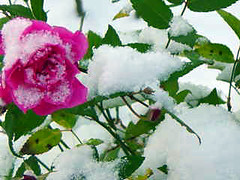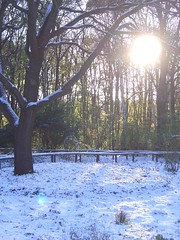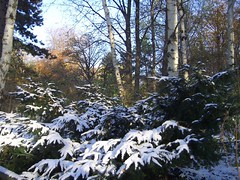Berlin is covered with a thin sprinkling of snow, scattered over the compacted, frozen ground and crunchy, icy grass. I love the way the snow squeaks as you tread on it, I love the way it traces the outline of the trees, giving them a second silhouette, the purer negative of the dark branches, and I love the way it dissolves almost as soon as it is touched, like a butterfly caught in your hand. We have already witnessed many different types of snowfall - the flat, feathery flakes floating though the air, thick with the promise of settling and laced with an intricate network of ice; the tiny, powdery shiver of snow which looks like icing sugar pouring down through a sieve; the small flakes bashing against the window, propelled through the air by the wind so they look like a swarm of midges attacking; and the driving rain of snow which leaves you bitterly cold and drenched to the skin.
On Saturday we wandered through the Tiergarten, listening to the silence which comes when a blanket of snow muffles the earth. We threw snowballs at the frozen lake (and each other); we stomped around making big footprints and we watched the sun sink lower and lower in the sky and glow peacefully through the snowy trees. I was reminded of Gustav Fjaestad's calm, snowbound paintings, and also of my favourite poem ever: Snow by Louis MacNeice:
I think this is a most incredible poem - it conveys so much in such a short space. The silence and menacing beauty of a world covered in snow comes across in the first stanza, especially the way snow is always such a shock when you look out of the window. The colours of the pink roses and the white snow, followed in the second verse by the bright gold of the tangerine paints a vibrant picture, composed almost like an impressionist painting by someone like Cailbotte: bay window with snow and pink roses, tangerine, and then in the last verse, the roaring red gold of the fire.The room was suddenly rich and the great bay-window was
Spawning snow and pink roses against it
Soundlessly collateral and incompatible:
World is suddener than we fancy it.World is crazier and more of it than we think,
Incorrigibly plural. I peel and portion
A tangerine and spit the pips and feel
The drunkenness of things being various.And the fire flames with a bubbling sound for world
Is more spiteful and gay than one supposes -
On the tongue on the eyes on the ears in the palms of one's
hands -
There is more than glass between the snow and the huge roses.

I love the idea of the 'drunkenness of things being various' - we are constantly bombarded by our senses until we are brimful of powerful impressions, and this is exactly what MacNiece intends to convey. He gives us the silence of the snow and the bubbling of the fire, the sight of the snow and the roses, the taste and smell of the tangerine and the toasty warmth of the fire. He draws these together in a list at the end of the poem, drawing our attention to the richness of our senses. In addition, with the word 'spiteful', he sets us slightly on edge - is the snow beautiful or malicious as well? The bubbling fire sounds like an alchemist, intent at his evil work, but it is not only spiteful but also gay. Is this another occasion of the intoxicating variety of the world, like the threatening beauty of the snow or the sinister yet comforting warmth of the fire? I have never fully understood the last line (any ideas?) but I will say that the final image of snow and huge roses, separated from the viewer by glass, finally frames the central image of the poem like a picture and allows us to watch the snow (and the "huge" roses) from the inside. We are sheltered from the snow, but we are not protected from the spiteful, gay fire.



No comments:
Post a Comment